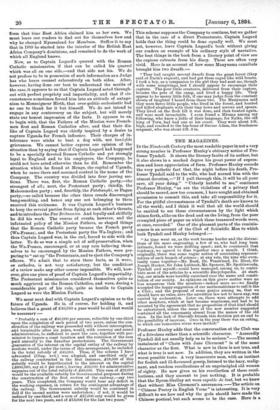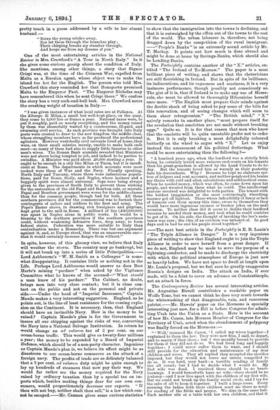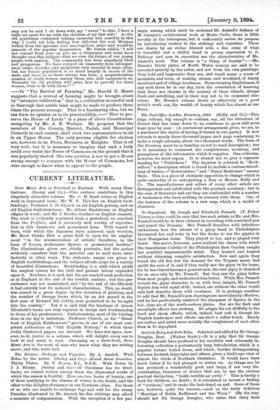THE MAGAZINES.
IN the Nineteenth Century the most readable paper in not a very strong number is Professor Huxley's obituary notice of Pro- fessor Tyndall. It shows the literary faults of its author, but it also shows in a marked degree his great power of expres- sion and keen appreciation of form. Professor Huxley records the very pathetic fact that, the night before his death, Pro- fessor Tyndall said to the wife, who had nursed him with the utmost devotion,—" If I pull through this, it will be all your care, all your doing." " Utterly hateful to me," continues Professor Huxley, "as are the violations of a privacy that should be sacred, now too common, I have sought and obtained permission to commit this, and take all responsibility for it.
For the pitiful circumstances of Tyndall's death are known to all the world; and I think it well that all the world should be enabled to see those circumstances by the light which shines forth, alike on the dead and on the living, from the poor crumpled piece of paper on which these treasured words were, at once, recorded." One of the pleasant parts of the reminis- cences is an account of the Club of Scientific Men to which both Tyndall and Huxley belonged :—
"As time went on, as the work became harder and the distrac- tions of life more engrossing, a few of us, who had long been intimate, found we were drifting apart ; and, to counteract that tendency, we agreed to dine together once a month. I think, originally, there was some vague notion of associating represen- tatives of each branch of science ; at any rate, the nine who even- tually came together—Mr. Busk, Dr. Frankland, Dr. Hirst, Sir Joseph Hooker, Sir John Lubbock, Mr. Spencer, Mr. Spottiswoode, Tyndall and myself—could have managed, among us, to contri- bute most of the articles to a scientific Encyclopaedia. At start- ing, our minds were terribly exercised over the name and consti- tution of our society. As opinions on this grave matter were no less numerous than the members—indeed more so—we finally accepted the happy suggestion of our mathematicians to call it the x Club; and the proposal of some genius among us, that we should have no rules, save the unwritten law not to have any, was carried by acclamation. Later on, there were attempts to add other members, which at last became wearisome, and had to be arrested by the agreement that no proposition of that kind should be entertained, unless the name of the new member suggested contained all the consonant§ absent from the names of the old ones. In the lack of Shivoiiib friends this decision put an end to the possibility of increase. Once in the year there was an outing, to which our respective wives were invited."
Professor Huxley adds that the conversation at the Club was of a frivolous rather than a scientific character. "Assuredly Tyndall did not usually help us to be serious."—The second instalment of " Chats with Jane Clermont" is of the same character as the first. What is new in them is not true, and what is true is not new. In addition, they are written in the worst possible taste. A very inaccurate man, with an instinct for foolish and ill-flavoured gossip, listened to the hazy, malig- nant, and random recollections of an unprincipled old woman of eighty. He now gives us his recollection of these recol- lections, and they amount to just nothing. It is probable that the Byron-Shelley set were capable de tout, but we knew that without Miss Clermont's assurances.—The article on "Chinese Poetry in English Verse" is interesting. It is very difficult to see how and why the gods should have made the Chinese poetical, but such seems to be the case. Here is a
pretty touch in a poem addressed by a wife to her absent husband :- " Drive the young orioles away,
• Nor let them through the branches play ; Their chirping breaks my slumber through, And keeps me from my dreams of you."
One of the most entertaining articles in the National _Review is Mrs. Crawford's " A Tour in North Italy." In it she gives some curious gossip about the condition of Italy. She mentions, among other things, a story that Signor Crispi was, at the time of the Crimean War, expelled from Malta as a Russian agent, whose object was to make the island too hot for the English. The person who told Mrs.
Crawford this story reminded her that Bonaparte promised Malta to the Emperor Paul. " The Emperor Nicholas may have remembered this when he sent Crispi there." We confess the story has a very cock-and-bull look. Mrs. Crawford notes the crushing weight of taxation in Italy:-
" I was given instances of what local rates are at Pallanza. At the Albergo di Milan, a small but well-kept place, on the quay, they come to 3,000 lire or francs a year. National taxes were, to put it roughly, paid on nearly everything, and the money raised by them was shamefully wasted by a cumbersome, ill-paid, and swarming civil service. As each province was brought into Italy posts were created to draw to the new kingdom the middle•class, whose struggling members have so far produced the professional agitators. However wretchedly civil servants lived at home, they were, on their small salaries merely, unable to make both ends meet—so many of them had also to supply little luxuries to other men's wives. The Roman Bank scandals revealed that Ministers were not above being tempted to job, and indeed to be parties to swindles. A Minister was paid about £8,000 sterling a year. It ought to be enough in a city like Milan or Turin, but it is insuffi- cient at Rome. The departments in which accounts were most cooked were those of War and the Navy. Fiscally speaking, North Italy and Tuscany, where there were industrious popula- tions, paid for Rome, Sicily, and Naples, where laziness and a beggarly spirit were almost universal. Sops were being always given to the provinces of South Italy to prevent them wishing for the restoration of the old Papal and Bourbon rule, or misrule. Papal and Bourbon government were worse for the middle•classes than for the common people, though bad for both. All these southern provinces did for the commonweal was to furnish their contingents of sailors and soldiers to the fleet and army. The Pope's Easter shows, in drawing rich foreigners and pilgrims, kept grist to the mill in Rome. A milliard of lire (£40,000,000) was spent in Naples alone in public works. It would be a blessing to the northern provinces if the southern provinces could, without weakening defensive force, drop away, to form federal states. Federation was more suitable to Italy than centralisation under a Monarchy. There was but one argument against it, and, as Europe stood, that was an unanswerable one— that it would certainly increase danger from without."
In spite, however, of this gloomy view, we believe that Italy will weather the storm. The country may go bankrupt, but it will not break up into a series of little Principalities
Lord Ashbourne's " W. H. Smith as a Colleague " is some- what disappointing. It contains little or nothing not in the Life. Perhaps Lord Ashbourne would answer as does Bret Ilarte's mining " pardner " when asked by the Vigilance Committee what he knows of the accused—" What should a man know of his pardner." The Cabinet, no doubt, brings men into very close contact; but it is close con- tact on the public and not on the personal and private side.—Under the head of " Imperial Insurance," Captain Maude makes a very interesting suggestion. England, as he points oat, is the line of least resistance for the coming explo- sion on the Continent. It is necessary, then, that England should have an invincible Navy. How is the money to be raised P Captain Maude's plan is for the Government to insure all our shipping against the risks of war, converting the Navy into a National Salvage Institution. In return he would change an ad valorem. tax of 2 per cent. on our ocean-borne traffic. This would give us twenty-four millions a year; the money to be expended by a Board of Imperial Defence, which should be of a non-party character. Ingenious as Captain Maude's plan is, we believe its effect might be as disastrous to our ocean-borne commerce as the attack of a foreign navy. The profits of trade are so delicately balanced that a 2 per cent. ad valorem, duty might be quite enough to lay up hundreds of steamers that now pay their way. We would far rather see the money required for the Navy raised by ordinary taxation than by a special tax on im- ports which, besides making things dear for our own con- sumers, would proportionately decrease our exports. " If thou wilt not buy, neither shalt thou sell," is a law which can- not be escaped.—Mr. Cannan gives some curious statistics
to show that the immigration into the towns is declining, and that it is outweighed by the efflux out of the towns to the rest of the world. The urban labourer is, therefore, not being dragged down by the competition of the rural immigrant.
—" People's Banks " is an extremely sound article by Mr. T. Mackay. It points out how much is done abroad and might be done at home by Savings-Banks, which should also be Lending-Banks.
The Fortnightly contains another of the "X." articles, en- titled " The Ireland of To-Morrow." The paper is a most brilliant piece of writing, and shows that the rhetoricians are still flourishing in Ireland. But in spite of its brilliance, its indiscretions, and its vagueness and scariness, it is a very insincere performance, though possibly not consciously so. The gist of it is, that if Ireland is to make any use of Home- rule, she must be allowed to thoroughly Hibernicise herself once more. "The English must prepare their minds against the double shock of being asked to pay some of the bills for this renovation, and of seeing changes which will seem to them sheer retrogression." " The British mind," " S " naively remarks in another place, " must prepare itself for the revelation that omelettes are not made without breaking eggs." Quite so. It is for that reason that men who know that the omelette will be quite uneatable prefer not to order it. But it is only breaking a moat delightfully coloured
butterfly on the wheel to argue with " X." Let us enjoy instead the amusement of his political flutterings. What could be more entertaining than the following?— "A hundred years ago, when the landlord was a strictly Irish being, he certainly levied more ruinous rack-rents on his tenants than his great-grandson is allowed by the Land Courts to do to- day. But the tenants loved him as warmly as their posterity hate his descendants. Why ? Because he kept no elaborate sys- tem of ledgers and rent accounts, and neither perplexed his brains nor theirs with cold and alien calculations and arithmetical sums. When he needed money, which was often, he came down upon his people, and wrested from them what he could. The intellectual exercise involved was delightful to both parties. The tenant with the boldest imagination or the most convincingly wheedling manner got off lightest. Those whose inflexibility of fancy or lack of humour cost them money this time, swore to themselves they would have more ingenious excuses or fresher jokes on the next occasion. To neither class did it occur to dislike their landlord because he needed their money, and took what he could contrive to get of it. On his side, the thought of invoking the law's assis- tance was rare ; the idea of an eviction was unheard of. In good days and in bad he and his people stood together."
—The next best article in the Fortnightly is E. B. Lenin's " The Triple Alliance in Danger." It is a very ingenious piece of writing to show that England ought to join the Triple Alliance in order to save herself from a great danger. If we do not, England may be made to serve the purpose of a lightning•conductor, and be made to discharge the electricity with which the political atmosphere of Europe is just now so heavily laden. We have not space to dwell at length upon Mr. Lenin's proposal, but we feel sure he greatly exaggerates Russia's designs on India. The attack on India, if ever made, will be a feint to cover an advance on Constantinople, not an attack in force.
The Contemporary Review has several interesting articles. Mr. Augustine Birrell contributes a readable paper on Wolfe Tone, but we cannot think he does very much towards the whitewashing of that disagreeable, vain, and rancorous patriot.—Mr. Haweis' paper on the Mormons is specially interesting just now, for a Bill is before Congress for admit- ting Utah into the Union as a State. Here is the account of how Mr. Canon, late Mormon Member of Congress for the Territory of Utah, acted when the abandonment of polygamy was finally forced on the Mormons :—
" • Well,' resumed Mr. Canon, I called my wives together—I explained to them the law. They were now free, I said, to depart, and to marry if they chose ; but I was morally bound to provide for them if they did not do so. We had lived long and happily together; I could never suffer them to want, and I should still provide for the education and maintenance of my dear children and wives. They all replied they accepted the sacrifice imposed, but they would not leave me unless compelled to do so. It was hard, very hard—a terrible rending of family ties all round; but I had to decide what I would do. My first wife was dead. I resolved there should be no heart- burnings. I would henceforth have no wife—there should be no jealousy—and I now live apart with the children of my first wife. But we could not break up the family social circle, and I try for the sake of all to keep it together. I built a large room. Every morning the ladies with their children meet me there as usual for reading of the Bible and prayer. We dine in the same hall. Each mother sits at a table with her own children, and that it may not be said I Bit down with my " wives " to dine, I have a table set apart for me with the children of my first wife.' As the old gentleman continued talking earnestly and sensibly in this way, I could not help feeling how different the real Mormon looked from the ignorant and unscrupulous satyr and would-be assassin of the popular imagination. Mr. Canon added, ' I will not conceal from you—as you are a clergyman and must have thought over this subject—that we view the future of our young people with anxiety. The community has been singularly blest and prosperous. We have enjoyed an immunity from intemper- ance, crime, disorder, and pauperism very unusual in large cities, but our female population is as usual largely in excess of the male, and there is. as there always has been, a preponderating number of single women among those who still emigrate to us. Presently the old problem will arise, how to provide for these women, what to do with them ? ' "
—In "The Revival of Farming," Mr. Harold E. Moore suggests that a revival of farming might be brought about by "intensive cultivation," that is, a cultivation so careful and so thorough that arable land might be made to produce three times the present average. That is a fascinating idea, but we can form no opinion as to its practicability.—" How to pre- serve the House of Lords" is a piece of clever Constitution- mongering by Mr. A. R. Wallace. He proposes that the members of the County, District, Parish, and Municipal Councils in each county, shall elect two representatives to sit in an Upper House. The only persons eligible for election are, however, to be Peers, Baronets, or Knights. That is all very well; but it is nonsense to imagine that such a body could ever resist the House of Commons on the ground that it was popularly elected. The true problem is not to get a House strong enough to compete with the House of Commons, but wise enough to know when to appeal to the people.












































 Previous page
Previous page